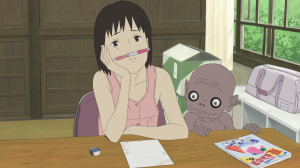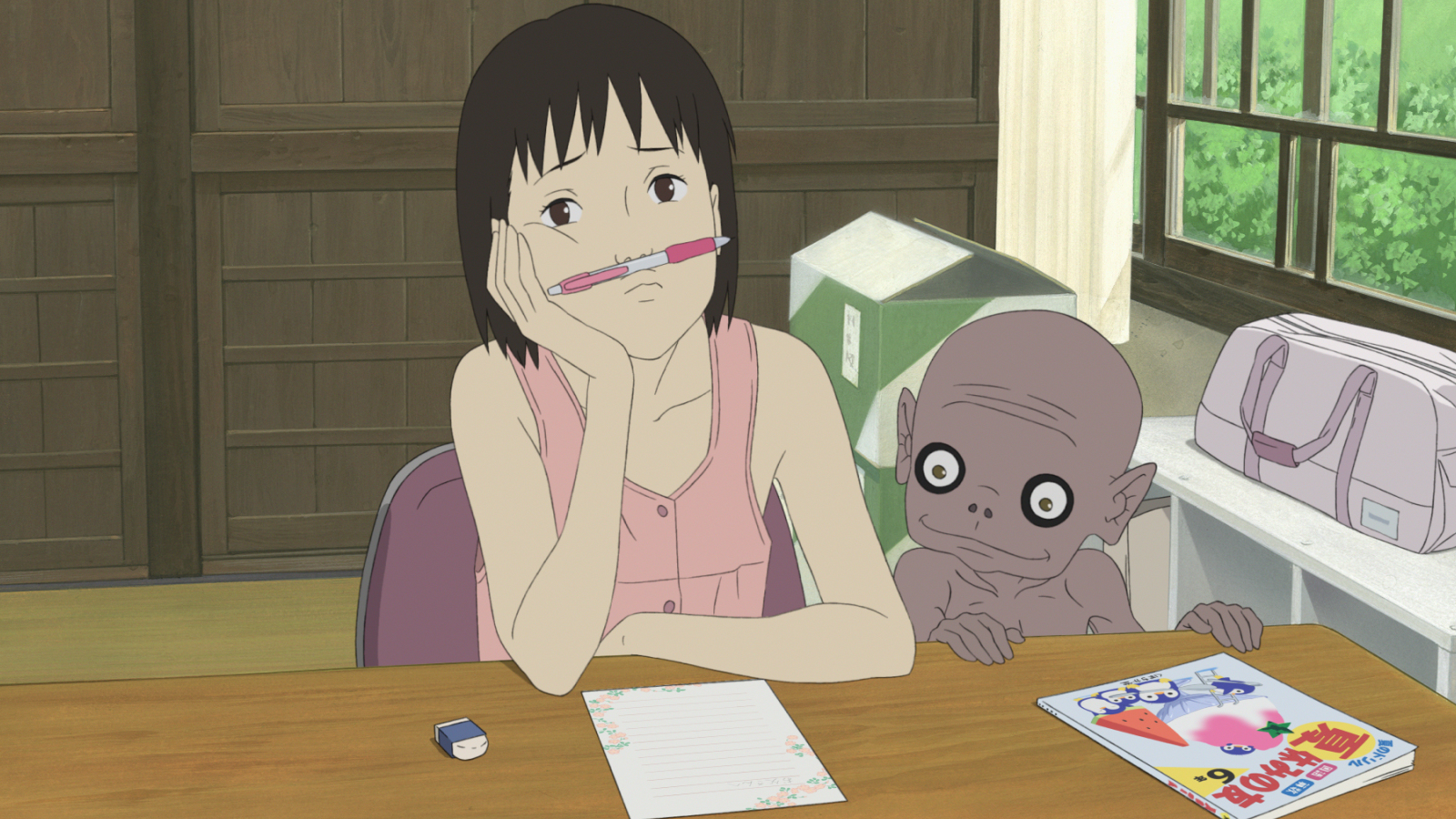A Letter to Momo (Momo e no Tegami) (2011)
Japanese subtitled version: Karen Miyama, Yuka, Toshiyuki Nishida, Koichi Yamadera.
English dubbed version: Amanda Pace, Stephanie Sheh, Fred Tatasciore, Dana Snyder.
Directed and written by Hiroyuki Okiura.
 Twelve-year-old Momo has recently moved with her mother Ikuko from a condo in Tokyo to a tiny, rural island in Japan, where Ikuko grew up and where both try to deal with the recent death of Momo’s father.
Twelve-year-old Momo has recently moved with her mother Ikuko from a condo in Tokyo to a tiny, rural island in Japan, where Ikuko grew up and where both try to deal with the recent death of Momo’s father.
They are grieving, each in her own, private way. Ikuko busies herself with trying to find a new job, leaving Momo to spend her days doing homework and making friends with other children on the island. In private moments, Ikuko kneels at the household shrine, looking through photo albums. Momo’s alone-time is often spent staring at a piece of paper, blank except for the words, “Dear Momo,” the beginning of a letter written by her father’s hand shortly before his death at sea.
 Momo doesn’t tell anyone, but her last words to her father were shouted in anger, a horrible expression of childish disappointment that she can never take back. As she tries somehow to manage the guilt, grief, loneliness, pain, and adjustment of this new life, mysterious things happen in her house and neighborhood. Small personal belongings disappear. Orchards are raided for their fruit before it is ready for harvest. Snacks disappear from the kitchen with only trash left in their place. Momo sees strange shapes and movements out of the corners of her eye as Ikuko leaves each morning, but nothing’s there when she turns her head to get a better look.
Momo doesn’t tell anyone, but her last words to her father were shouted in anger, a horrible expression of childish disappointment that she can never take back. As she tries somehow to manage the guilt, grief, loneliness, pain, and adjustment of this new life, mysterious things happen in her house and neighborhood. Small personal belongings disappear. Orchards are raided for their fruit before it is ready for harvest. Snacks disappear from the kitchen with only trash left in their place. Momo sees strange shapes and movements out of the corners of her eye as Ikuko leaves each morning, but nothing’s there when she turns her head to get a better look.
A Letter to Momo is directed by Hiroyuki Okiura (director of Jin-Roh and animator of Akira and Metropolis) who sticks mostly to light pastels and gauzy lighting in a way that both highlights the quietude of Momo’s farming community and hearkens to the illustrations in our favorite childhood storybooks. Yet while the I was reminded more than once of the gentle color tones in such stories as William Steig’s Sylvester and the Magic Pebble, the detail and scope of Okiura’s animation can only be compared to the best of its Japanese tradition. I paused the film at least ten times just to absorb the beautiful framing and composition, which ultimately was more affecting than the story’s climax and resolution.
For while this movie is a visual experience I wanted to go through again, its pacing is at times maddening for a grown-up viewer like me. Certain plot revelations take forever to arrive, and most teenaged audiences will see them coming like a bullet train on Lipovitan. I will concede that certain sight gags and bodily stunts will probably amuse a less mature audience, and there are a couple of chase sequences that manage to find a good groove, but even they feel just a bit long despite some excellent timing.
It is unquestionably a movie for children, and older elementary-schoolers will probably enjoy it. While the parents who take them certainly won’t be bored, they will find a good portion of the film silly, and they should be advised that A Letter to Momo doesn’t shy away from the despair two young women confront as they stare down the reality of death. When one major character falls dangerously ill, Momo must deal with the possibility of yet another death, a weighty, sobering thought for viewers of any age, and I would caution parents to consider their children’s sensitivity to such themes before heading to the box office. Young people who can handle the serious issues could leave theaters with a new favorite.
Recommended for tweens and their grown-up, animation-loving adults. Cautiously recommended for children slightly younger.
7/10 (points taken away for excessive silliness but points given back for gorgeous animation)
—–
Landmark Theatres engagements begin Friday, September 5, 2014
The film’s running time is 120 minutes; it is not rated. It will be presented in two language versions with different showtimes: in English language voice cast, and in Japanese with English subtitles.
Landmark’s Opera Plaza Cinemas, 601 Van Ness, San Francisco (415) 771-0183
Landmark’s Shattuck Cinemas, 2230 Shattuck Avenue, Berkeley (510) 644-2992








